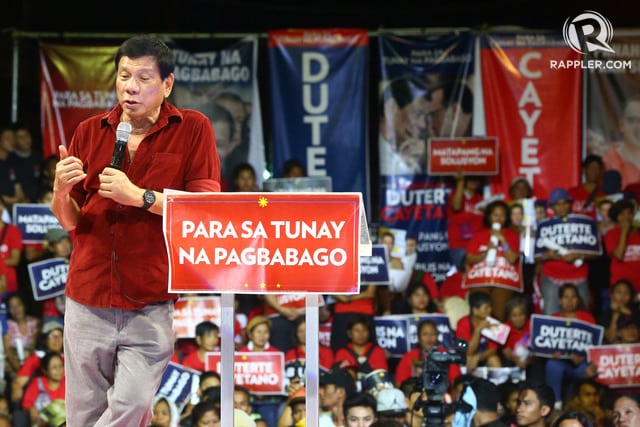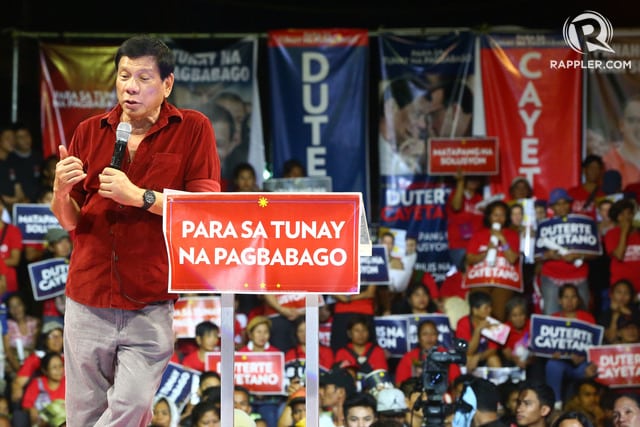Elections in the Philippines can be very funny. The candidates often try to connect with their electorate by taking recourse to singing and dancing. Cutting bawdy jokes and making funny faces or dressing outrageously comes very readily to politicians in their eagerness to get through to voters. There are no sacred cows on the campaign trail in the Philippines.
Yet, the front-runner who got elected Monday as the next president, Rodrigo Duterte, also known as the “Donald Trump of the Philippines,” may have crossed all limits when he branded the Pope a “son of a whore,” told the American and Australian ambassadors to “shut their mouths,” recounted how he had personally killed inmates during a prison riot in Davao in 1989 where he used to be Mayor, or boasted about his mistresses and sexual prowess.
The nadir was reached when he said in the aftermath of the prison riot, that he came to know that an Australian missionary had been raped and murdered. Duterte joked, “I was mad she was raped. But she was so beautiful. I thought, ‘The Mayor should have been the first.’ ” That was when the US and Australian envoys took serious exception, whereupon Duterte raised the prospect of cutting diplomatic relations with the countries they represented.
On a more serious note, Al Jazeera had a story on him yesterday once elected as the next president with as many votes as those cast for his two closest opponents together. It was entitled, “The contradictions of Rodrigo Duterte: Expected president’s persona as a gun-loving, motorcycle-riding womaniser with a death squad is only part of the story.”
Indeed, what explains the Duterte tidal wave? The East Asia Forum intellectualized the Duterte phenomenon as the “politics of anger.” But, curiously, it is not a revolt of the poor. “It is middle class-driven. It is angry protest most acute among the modestly successful, including call centre workers, Uber drivers and overseas Filipino workers.”
The magazine explains:
The angry middle class constitute an emerging counter-elite, who feel left out by the ruling oligarchy. Duterte’s emerging neo-authoritarian constituency was initially concentrated among some elites and the middle class, and has only recently gained electoral support from the poor.
Despite robust economic growth during the past six years of the Aquino presidency, the middle class suffers from a lack of public services, horrendous land and air traffic, persistent corruption and fears about the breakdown of peace and order. They see the poor receiving conditional cash transfers, while the rich profit from public–private partnerships, and feel short-changed.
It is a riveting analysis. Read it here.
However, the really sensational thing about President-elect Duterte is going to be that his foreign policy agenda has a far-reaching idea that is at once stunning and perfectly understandable – What to about his country’s very tense relationship with China?
From his remarks so far, Duterte may put a hole in the US’ rebalance in Asia through which an elephant can pass. Speaking to reporters on Monday night even as the poll result had just come out, he said three things that must have sent shock waves all the way to the White House in Washington:
One, that he is open to cooperation with China in oil and gas exploration in the disputed islands in the South China Sea;
Two, that he doubted US sincerity to walk the talk and actually back the Philippines in any confrontation with China if push comes to shove; and,
Three, he doesn’t see the need for any international arbitration to resolve the territorial dispute with China.
Duterte may moderate his stance once in power, as politicians anywhere are wont to. Of course the US has much leverage over the Philippines, which is a virtual American colony. But then Duterte also probably knew that he voiced the opinion of a silent majority in his country which feels uncomfortable about being caught in the middle in the US-China rivalry for influence in the region.
Duterte cannot be unaware that China can be a driver of growth for the Philippine economy. Now, will he pull out of the American embrace? If he does that, one of President Barack Obama’s signature foreign policy initiatives goes for a toss. (Hillary Clinton has just joined Bernie Sanders and Donald Trump to record her rejection of the Trans-Pacific Partnership agreement, here.) What is it that is now left of the US military and economic rebalance in Asia as the Obama presidency gets over?
To be sure, Beijing is watching closely. The Foreign Ministry spokesman reacted hopefully that ties with the Philippines had “run into severe difficulty in recent years” and hoped the new government would “push Sino-Philippine relations back to a healthy development path.”
The Communist Party tabloid Global Times was more forthcoming. In an editorial on Wednesday, it took note, “He opposes the idea of going to war with China, wants direct negotiation with Beijing about the South China Sea, and doesn’t believe in solving the conflict through an international tribunal.” Read the editorial here.
Presumably, New Delhi is following the dramatic events in the South China Sea. For sure, the tectonic plates of that region’s geopolitics are shifting. What a splendid course correction India took by refusing to join the US-led “joint patrols” in the South China Sea!
Reprinted with permission from Indian Punchline.



